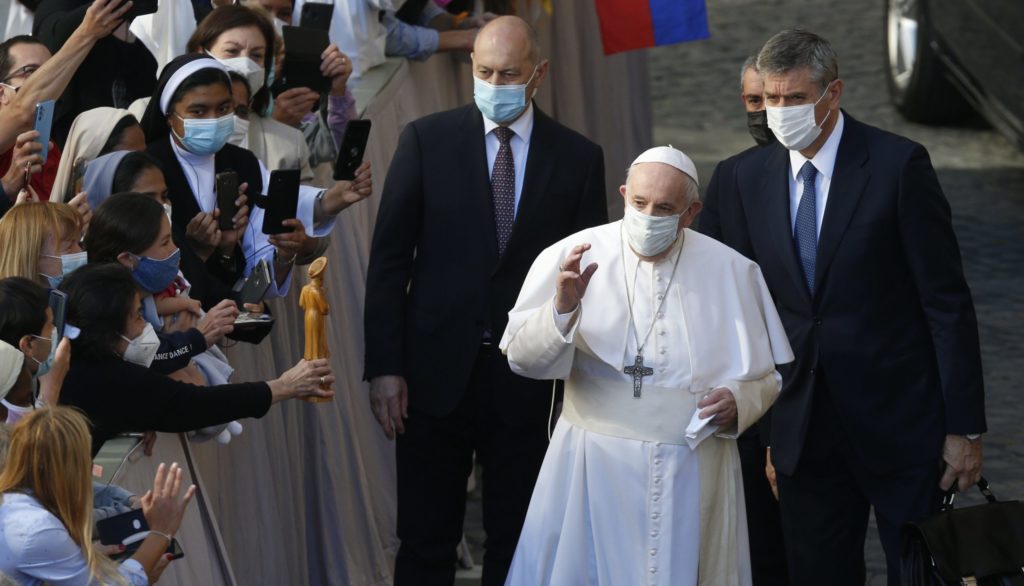Pope Francis held a general audience in the Courtyard of St. Damasus, with a reduced number of faithful due to health restrictions.
Francis began his catechesis by reflecting on why it seems that God does not respond to our requests: "There is a radical response to prayer, which derives from an observation we all make: we pray, we ask, but sometimes it seems that our prayers are not heard: what we have asked for - for ourselves or for others - does not happen. If, moreover, the reason for which we prayed was noble (such as intercession for the health of a sick person, or for the cessation of a war), the failure to pray seems scandalous to us. "There are those who stop praying because they think that their prayer is not heard" (Catechism of the Catholic ChurchIf God is Father, why doesn't He listen to us? He who has assured us that He gives good things to the children who ask Him (cfr. Mt 7,10), why does he not respond to our requests?"
"Our Father"
"The Catechism," says Francis, "offers us a good synthesis of the question. It warns us of the risk of not living an authentic experience of faith, but of transforming our relationship with God into something magical. In fact, when we pray, we can run the risk of not being the ones who serve God, but of pretending that he is the one who serves us (cf. n. 2735). Here, then, is a prayer that is always demanding, that wants to direct events according to our design, that admits no other projects but our desires. Jesus, however, had great wisdom in putting the "Our Father" on our lips. It is a prayer of petitions only, as we know, but the first ones we utter are all on God's side. They ask for the fulfillment not of our project, but of His will in relation to the world. Better to let Him do it: "Thy name be hallowed, thy Kingdom come, thy will be done" (Mt 6,9-10)".
"The Apostle Paul reminds us that we do not even know what is convenient to ask for (cfr. Rm 8,26). When we pray we should be humble, so that our words are indeed prayers and not a vaniloquy that God rejects. It is also possible to pray for the wrong motives: for example, to defeat the enemy in war, without asking ourselves what God thinks of that war. It is easy to write on a banner "God is with us"; many are anxious to assure that God is with them, but few care to verify if they are indeed with God. In prayer, it is God who must convert us, not us who must convert God".
Prayers impregnated with suffering
"Nevertheless," the Pope continued, "a scandal remains: when people pray with a sincere heart, when they ask for goods that correspond to the Kingdom of God, when a mother prays for her sick child, why does it sometimes seem that God does not listen? To answer this question, it is necessary to meditate calmly on the Gospels. The passages of Jesus' life are full of prayers: many people wounded in body and spirit ask him to heal them; there are those who ask him for a friend who no longer walks; there are fathers and mothers who bring him sick sons and daughters... They are all prayers impregnated with suffering. It is an immense chorus that invokes: "Have mercy on us".
"We see that sometimes Jesus' response is immediate, but in other cases it is deferred in time. Let us think of the Canaanite woman who pleads with Jesus for her daughter: this woman has to insist for a long time to be heard (cfr. Mt 15,21-28). Or let us also think of the paralytic carried by his four friends: initially Jesus forgives his sins and only in a second moment he heals him in the body (cfr. Mc 2,1-12). Therefore, on some occasions the solution to the drama is not immediate".
The only flame of faith
The Pope reflected on the miracle of Jairus' daughter: "From this point of view, the healing of Jairus' daughter deserves attention above all (cfr. Mc 5,21- 33). There is a father who runs out of breath: his daughter is sick and for this reason he asks Jesus for help. The Teacher accepts immediately, but while they are on their way to the house another healing takes place, and then comes the news that the girl is dead. It seems the end, but Jesus says to the father: "Do not be afraid; just have faith" (Mc 5,36). "Keep on having faith": faith sustains prayer. And indeed, Jesus will awaken this child from the sleep of death. But for a certain time, Jairus has had to walk in the dark, with the only flame of faith".
Francis assured that the Lord "Even the prayer that Jesus addresses to the Father in Gethsemane seems to remain unheard. The Son will have to drink to the full the chalice of the Passion. But Holy Saturday is not the final chapter, because on the third day there is the resurrection: Evil is lord of the penultimate day, never of the last. For it belongs to God alone, and it is the day on which all human yearnings for salvation will be fulfilled".








